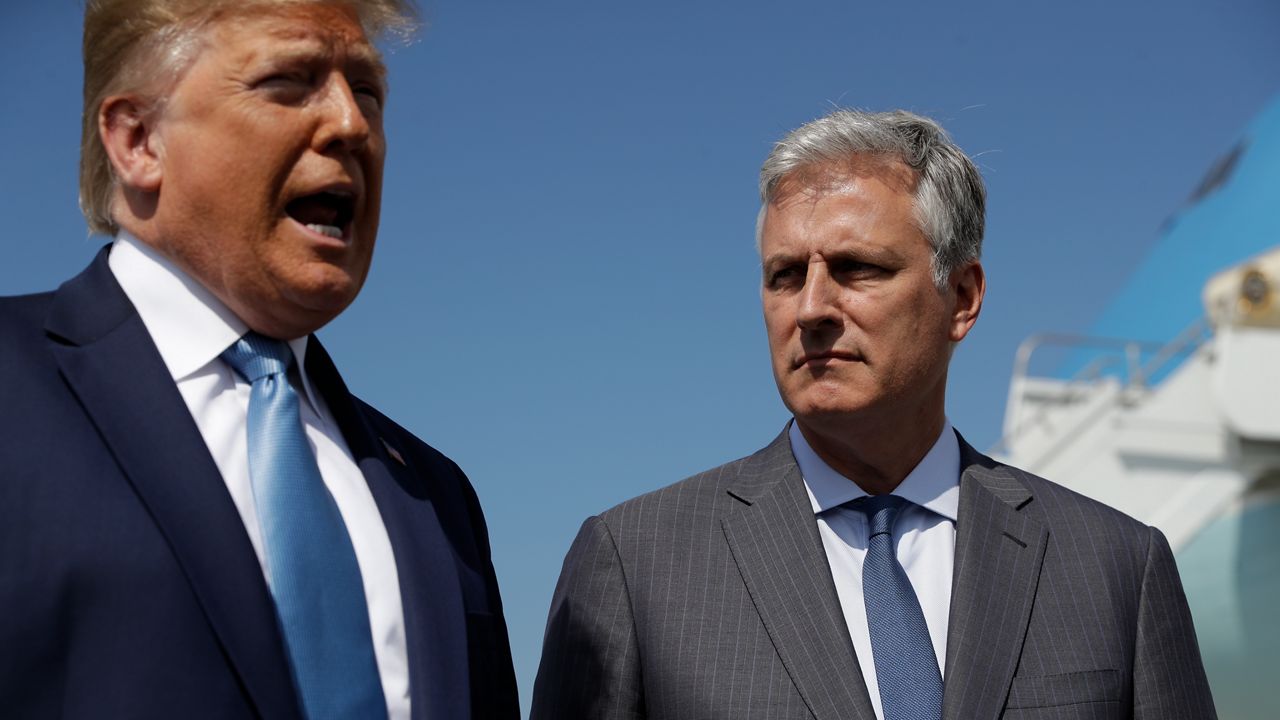Former President Donald Trump’s final national security adviser from his first term, Robert O’Brien, advised him in the pages of Foreign Policy magazine to cut off China economically and diplomatically, deploy the entire Marine Corps to the Pacific and resume testing of nuclear weapons for the first time in decades.
What You Need To Know
- Former President Donald Trump’s final national security adviser from his first term, Robert O’Brien, advised him to resume testing of nuclear weapons for the first time in decades
- The last U.S. nuclear weapons test was Sept. 23, 1992, in Nevada
- O’Brien, who served as Trump’s national security adviser from 2019 to 2021, is widely seen as likely to have a role in a future Trump administration
- O’Brien called for a much more aggressive foreign policy toward China, including deploying the entirety of the U.S. Marine Corps to the Pacific
O’Brien, who served as Trump’s national security adviser from 2019 to 2021, is widely seen as likely to have a role in a future Trump administration. In May, he traveled to Israel to meet with Prime Minister Benjamin Netanyahu alongside two other former Trump administration officials, declining to say if he was representing the former president while telling NBC News he was “in regular contact” with Trump.
“The United States has to maintain technical and numerical superiority to the combined Chinese and Russian nuclear stockpiles,” O’Brien wrote in a lengthy op-ed published on Tuesday, arguing that the U.S. must display its nuclear might as China and Russia are expanding their arsenals. “Washington must test new nuclear weapons for reliability and safety in the real world for the first time since 1992 — not just by using computer models.”
The last U.S. nuclear weapons test was Sept. 23, 1992, in Nevada. Testing was stopped amid the negotiation of the Comprehensive Test Ban Treaty, which was signed by the U.S. in 1996 and bars any signee from conducting “any nuclear weapon test explosion or any other nuclear explosion,” according to the Arms Control Association. Only one country has tested a nuclear weapon in the 21st century: North Korea.
“Dangerous, counterproductive Dr. Strangelove thinking. Robert O'Brien calls for resuming U.S. nuclear testing for the first time since 1992 and U.S. production of [highly enriched uranium and plutonium] despite our surplus,” Arms Control Association director Daryl Kimball wrote on social media. “Nuclear bullying doesn't work and leads to arms racing.”
Roughly 12,000 nuclear warheads exist globally, according to the Federation of American Scientists. The U.S. holds 5,044 of those, second only to Russia’s estimated 5,580. China has about 500 in its stockpile, with the U.S. Department of Defense projecting they will have over 1,000 by 2030, according to a report to Congress last year.
For their part, the Biden administration does not believe expanding the U.S. nuclear stockpile is in the best interest of U.S. foreign policy. In a speech to the Arms Control Association last June, Biden national security adviser Jake Sullivan said the president was focused on modernizing the U.S. nuclear arsenal and pursuing arms control agreements with Russia, China and other nations.
“The United States does not need to increase our nuclear forces to outnumber the combined total of our competitors in order to successfully deter them. We’ve been there. We’ve learned that lesson,” Sullivan said, later adding whatever limits the Biden administration would agree to would “of course be impacted by the size and scale of China’s nuclear buildup.”
In his op-ed, O’Brien called for a much more aggressive foreign policy toward China, including deploying the entirety of the U.S. Marine Corps to the Pacific, helping our allies there build up their military with arms deals of the kind the U.S. has long made with Israel, and by decoupling the U.S. economy from China’s with 60% tariffs on Chinese goods and strict export controls on “any technology that might be of use to China.”
“The Pentagon should consider deploying the entire Marine Corps to the Pacific, relieving it in particular of missions in the Middle East and North Africa,” O’Brien wrote. “U.S. bases in the Pacific often lack adequate missile defenses and fighter jet protection — a scandalous deficiency that the Defense Department should fix by quickly shifting resources from elsewhere.”
Currently, around 29,000 Marines are deployed in dozens of countries across the world, according to the Defense Department. As of March 31, the vast majority of those Marines — 20,312 — were deployed in Japan, with hundreds more stationed in South Korea and the Philippines.
“This morass of American weakness and failure cries out for a Trumpian restoration of peace through strength. Nowhere is that need more urgent than in the contest with China,” O’Brien wrote, later adding: “In November, the American people will have the opportunity to return to office a president who restored peace through strength — and who can do it again.”



